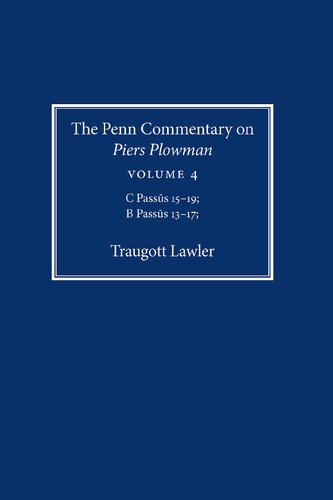

Most ebook files are in PDF format, so you can easily read them using various software such as Foxit Reader or directly on the Google Chrome browser.
Some ebook files are released by publishers in other formats such as .awz, .mobi, .epub, .fb2, etc. You may need to install specific software to read these formats on mobile/PC, such as Calibre.
Please read the tutorial at this link: https://ebookbell.com/faq
We offer FREE conversion to the popular formats you request; however, this may take some time. Therefore, right after payment, please email us, and we will try to provide the service as quickly as possible.
For some exceptional file formats or broken links (if any), please refrain from opening any disputes. Instead, email us first, and we will try to assist within a maximum of 6 hours.
EbookBell Team

4.8
84 reviewsThe detailed and wide-rangingPenn Commentary on "Piers Plowman"places the allegorical dream-vision of the poem within the literary, historical, social, and intellectual contexts of late medieval England, and within the long history of critical interpretation of the work, assessing past scholarship while offering original materials and insights throughout. The authors' line-by-line, section by section, and passus by passus commentary on all three versions of the poem and on the stages of its multiple revisions reveals new aspects of the poem's meaning while assessing and summarizing a complex and often divisive scholarly tradition. The volumes offer an up-to-date, original, and open-ended guide to a poem whose engagement with its social world is unrivaled in English literature, and whose literary, religious, and intellectual accomplishments are uniquely powerful.
The Penn Commentaryis designed to be equally useful to readers of the A, B, or C texts of the poem. It is geared to readers eager to have detailed experience ofPiers Plowmanand other medieval literature, possessing some basic knowledge of Middle English language and literature, and interested in pondering further the particularly difficult relationships to both that this poem possesses. Others, with interest in poetry of all periods, will find the extended and detailed commentary useful precisely because it does not seek to avoid the poem's challenges but seeks instead to provoke thought about its intricacy and poetic achievements.
Covering passūs C.15-19 and B.13-17, Volume 4 of thePenn Commentary on "Piers Plowman"creates a completevade mecumfor readers, identifying and translating all Latin quotations, uncovering allusions, providing full cross-reference to other parts of the poem, drawing in relevant scholarship, and unraveling difficult passages. Like the other commentaries in the series, this volume contains an extensive overview and analysis of each passus, and the subdivisions within, large and small, and discusses all differences between the two versions. It pays careful attention to the poem at the literal level as well as to Latin texts that are analogues or even possible sources of Langland's thought and it emphasizes the comedy of the poem, of which these passūs offer a number of examples.